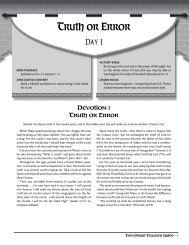The Fall oF SaTan - Answers in Genesis
The Fall oF SaTan - Answers in Genesis
The Fall oF SaTan - Answers in Genesis
You also want an ePaper? Increase the reach of your titles
YUMPU automatically turns print PDFs into web optimized ePapers that Google loves.
1. Who is Satan and was he<br />
always called “Satan”<br />
<strong>The</strong> first use of the name Satan is found <strong>in</strong> 1 Chronicles 21:1; chronologically,<br />
this is surpassed by Job, which was written much earlier.<br />
Satan is found throughout Job chapters 1 and 2. Satan (satan) literally<br />
means adversary <strong>in</strong> Hebrew. <strong>The</strong> etymology of the name is discussed<br />
briefly by Just<strong>in</strong> Martyr, an early church father, around A.D. 156. He says:<br />
Or He meant the devil by the lion roar<strong>in</strong>g aga<strong>in</strong>st Him: whom<br />
Moses calls the serpent, but <strong>in</strong> Job and Zechariah he is called the<br />
devil, and by Jesus is addressed as Satan, show<strong>in</strong>g that a compounded<br />
name was acquired by him from the deeds which he<br />
performed. For “Sata” <strong>in</strong> the Jewish and Syrian tongue means apostate;<br />
and “Nas” is the word from which he is called by <strong>in</strong>terpretation<br />
the serpent, i.e., accord<strong>in</strong>g to the <strong>in</strong>terpretation of the Hebrew term,<br />
from both of which there arises the s<strong>in</strong>gle word Satanas. 4<br />
Another name appears <strong>in</strong> the Old Testament <strong>in</strong> the K<strong>in</strong>g James Version:<br />
How art thou fallen from heaven, O Lucifer, son of the morn<strong>in</strong>g!<br />
How art thou cut down to the ground, which didst weaken<br />
the nations! (Isaiah 14:12; KJV).<br />
This is the only passage that uses the name Lucifer to refer to Satan.<br />
This name doesn’t come from Hebrew but Lat<strong>in</strong>. Perhaps this translation<br />
<strong>in</strong>to English was <strong>in</strong>fluenced by the Lat<strong>in</strong> Vulgate, which uses this name. In<br />
Lat<strong>in</strong>, Lucifer means light br<strong>in</strong>ger.<br />
<strong>The</strong> Hebrew is heylel and means light bearer, sh<strong>in</strong><strong>in</strong>g one, or morn<strong>in</strong>g<br />
star. Many modern translations translate this as “star of the morn<strong>in</strong>g” or<br />
“morn<strong>in</strong>g star.” In this passage, heylel refers to the k<strong>in</strong>g of Babylon and<br />
Satan figuratively. Of course, Jesus lays claim to this title <strong>in</strong> Revelation<br />
22:16. Though the passage <strong>in</strong> Revelation is <strong>in</strong> Greek while the passage <strong>in</strong><br />
– 13 –
















